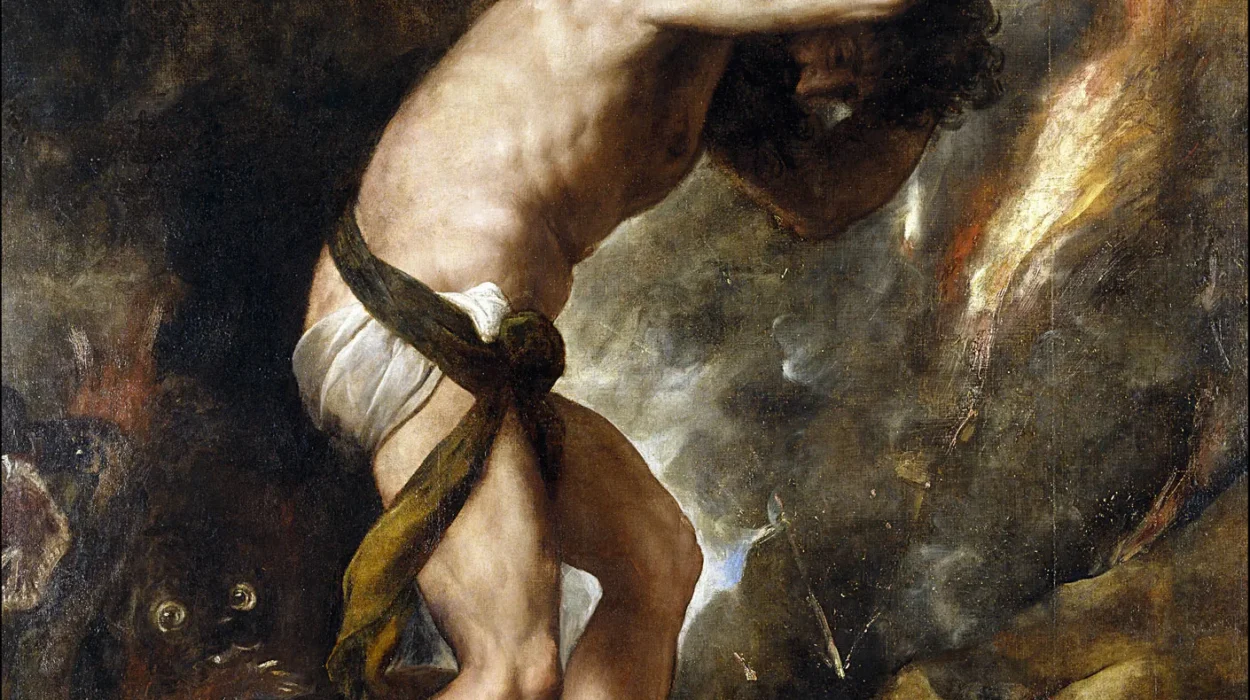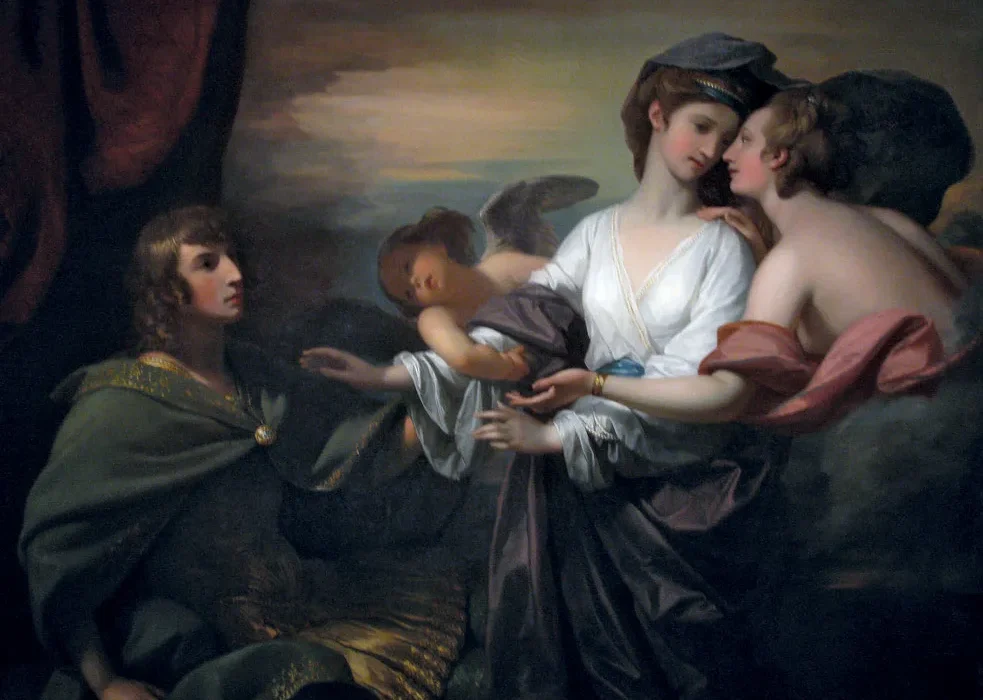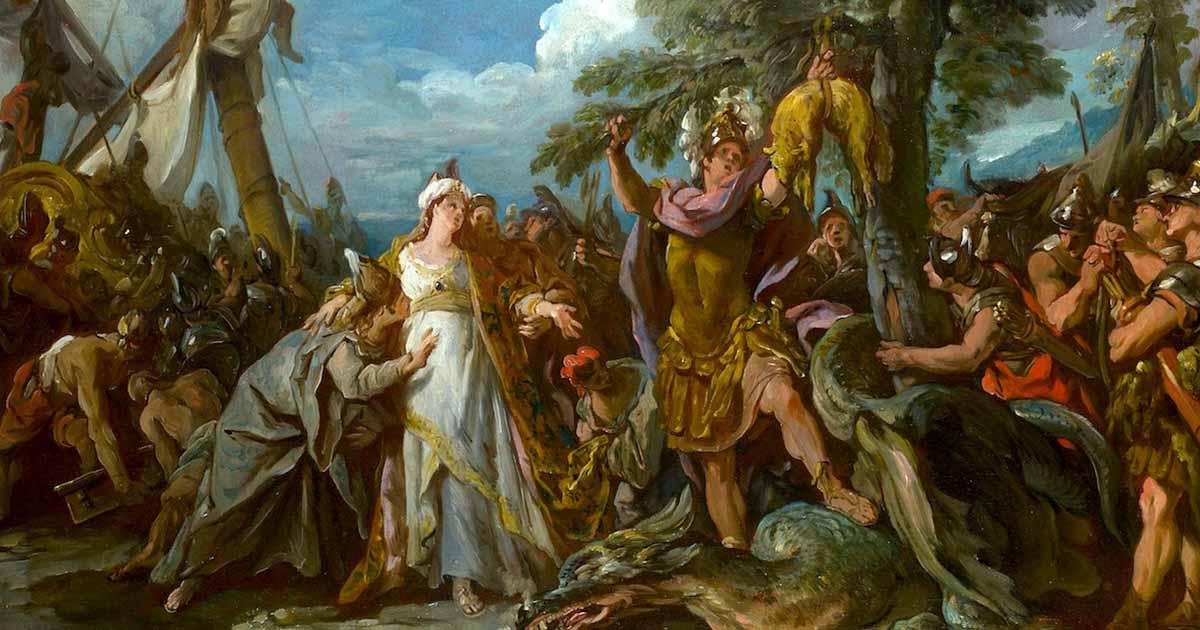Among the shining gods of Olympus, who embodied wisdom, beauty, and justice, one figure loomed darker and more terrifying. His was the cry of the battlefield, the fury of clashing steel, the terror of bloodied earth. He was Ares, the god of war, and in him lived the untamed violence of human conflict. Unlike Athena, whose war was strategy and justice, Ares represented the raw chaos of combat—the blind rage that consumes both victor and vanquished.
To the Greeks, Ares was not a god of glory, but of bloodlust and destruction. He was the shrieking storm that swept across armies, the embodiment of the terrible price of violence. And yet, despite his fearsome reputation, he was a necessary force. Where there is life, there is conflict. Where there are kingdoms, there are wars. Ares was not loved, but he could not be ignored. He was the eternal shadow that follows humanity’s passion for power and dominance.
Birth of a God of Strife
Ares was the son of Zeus, the king of the gods, and Hera, the queen of Olympus. Though he carried the blood of Olympus’ rulers, he was never cherished like Athena or Apollo. His very nature set him apart. From the moment of his birth, Ares represented something dangerous: the uncontrollable fury that even gods feared.
Unlike his sister Athena, who was born fully armed from the head of Zeus and symbolized reasoned warfare, Ares embodied unrestrained conflict. He was not the god of defense, nor of justice, nor of noble battles. He was the god of slaughter, of rage, of battle frenzy. To call on Ares was to invite destruction without measure.
This made him a controversial figure among both gods and mortals. The Olympians often disdained him, yet they could not deny that war was part of existence. Mortals feared him, yet armies invoked his name before charging into battle. He was both a curse and a necessity.
The Duality of War: Ares and Athena
No comparison reveals Ares’ nature better than his eternal contrast with Athena. Both were gods of war, yet they embodied opposing philosophies. Athena represented wisdom, justice, and strategy. Her wars were purposeful, fought for protection and order. She guided heroes like Odysseus and Perseus, offering counsel and reason.
Ares, by contrast, represented the chaotic side of war—rage without thought, violence without justice, the frenzy that blinds soldiers. His wars were destructive and indiscriminate. He stood not for victory but for slaughter. If Athena was the disciplined commander, Ares was the blood-soaked warrior, swinging his spear without care for consequence.
This duality reflected the Greek understanding of war itself. War could be noble, when fought for justice and defense, but it was also brutal and devastating. In Athena they saw the ideal; in Ares they saw the terrible reality.
The Companions of Bloodshed
Ares was rarely alone. He was often depicted in the company of monstrous figures who personified the horrors of war. Among them were:
- Deimos (Terror) and Phobos (Fear), his sons with Aphrodite, who rode with him into battle, spreading panic among mortals.
- Eris (Discord), the goddess of strife, who delighted in sowing conflict and whose actions would one day spark the Trojan War.
- Enyo (Horror), sometimes called the “sister of Ares,” who reveled in the destruction of cities.
These companions showed that Ares was not merely a god of strength, but of the emotions that consume warriors—terror, frenzy, and bloodlust. When Ares entered a battlefield, he brought with him not only death but also the psychological torment of war.
Ares and Aphrodite: Love and War
Despite his violent nature, Ares was not without passion. His most famous relationship was with Aphrodite, the goddess of love and beauty. Their union was one of opposites—love entwined with war, beauty coupled with destruction.
Though Aphrodite was married to Hephaestus, the god of craftsmanship, her heart was captured by Ares’ raw strength. Their affair was infamous, and when Hephaestus discovered it, he trapped the lovers in an unbreakable net of bronze, exposing them to the laughter of the Olympians.
Yet their bond endured, producing children who symbolized the union of love and war. Among them were Phobos and Deimos, who embodied the fear and panic of battle, and Harmonia, goddess of harmony, a paradoxical child born of passion and conflict. Their love story revealed an essential truth: that war and love are inseparable forces, often colliding and intertwining in human life.
The Trojan War: Ares on the Battlefield
Ares played a significant role in the epic of the Trojan War, where gods and mortals alike clashed in one of the greatest stories of Greek mythology. Initially, Ares supported the Trojans, fighting fiercely alongside them. Yet his loyalty shifted, as was his nature, and he occasionally aided the Greeks.
One of his most famous moments came when he confronted the Greek hero Diomedes, who, with Athena’s guidance, wounded Ares with a spear. The god of war roared in agony, his cries echoing like thunder, and fled the battlefield to Olympus. Even the god of war could be humbled, proving that brute force without wisdom was vulnerable.
The Trojan War highlighted Ares’ chaotic nature. He fought passionately, but without loyalty or strategy. His shifting sides reflected the unpredictable tides of war, where alliances crumble and rage overwhelms reason.
Ares and the Ancient Greeks
Unlike other Olympian gods, Ares was not widely loved by the Greeks. While Athena received temples and worship for her role in guiding just wars, Ares was often regarded with suspicion. His shrines were fewer, his cults smaller, and his name invoked with caution.
Yet in places like Sparta, Ares held a special place. The Spartans, who built their society on military strength, revered him as a patron. For them, war was not a curse but a way of life, and Ares represented the spirit of conquest and fearlessness.
The Athenians, however, saw him differently. In their city stood the Areopagus, a hill named after Ares, where trials for murder were held. According to myth, Ares himself was tried there by the gods for the killing of Halirrhothius, the son of Poseidon. This association of Ares with murder and justice reflected the Athenians’ ambivalence toward him—acknowledging his power, but wary of his chaos.
Ares Beyond Greece: The Roman Mars
While the Greeks distrusted Ares, the Romans transformed him into Mars, one of their most honored deities. Mars was not only the god of war but also a guardian of agriculture and a father of the Roman people. Unlike Ares, Mars was noble, disciplined, and central to Roman identity.
The difference reveals much about the two cultures. The Greeks saw war as destructive and tragic, hence their disdain for Ares. The Romans, however, built an empire on conquest and discipline, and so they reshaped Mars into a figure of order, strength, and prosperity.
Thus, Ares and Mars stand as two faces of the same god—one feared as chaos, the other revered as civilization’s protector.
Symbolism of Ares
Ares symbolized more than just battle. He represented the raw, primal instincts of humanity. He was the surge of adrenaline, the thirst for dominance, the fury that blinds reason. In him, the Greeks saw both the danger and inevitability of violence.
His symbols included the spear, shield, vulture, and dog—creatures and weapons associated with bloodshed. The vulture fed on the dead after battle, while the dog embodied loyalty twisted into ferocity. To invoke Ares was to summon these forces into the human heart.
In art, Ares was depicted as a powerful, youthful warrior, often armed and armored, embodying physical perfection. Yet behind his beauty was terror. He was the embodiment of war’s allure and its horror, a reminder that violence can be both seductive and destructive.
The Legacy of Ares
Though not beloved in his own time, Ares’ legacy has endured. He continues to appear in literature, art, and modern culture as a symbol of untamed violence and passion. Writers, poets, and philosophers have reflected on his nature, asking whether war is an unavoidable part of the human condition.
In many ways, Ares is timeless. His presence can be felt in every battlefield, every conflict, every outburst of chaos in human history. He is the embodiment of our struggle with aggression, our fascination with power, and our fear of destruction.
Yet Ares also teaches a hidden lesson. For just as he was often defeated or humiliated, so too does blind violence eventually fall. Strength without wisdom cannot endure. Rage without justice leads only to ruin. Ares reminds us of the cost of unchecked fury—and of the need to temper power with reason.
The Eternal Cry of War
In the grand tapestry of Greek mythology, Ares stands as a figure both feared and essential. He is the god who personifies the truth humans often wish to forget—that war is not noble, but brutal; not orderly, but chaotic. He is the reminder that in every act of violence, there lies not only destruction but also a reflection of ourselves.
Ares may not have been the most beloved god of Olympus, but he was one of the most honest. He did not disguise war as glorious or just. He revealed it for what it truly is: blood, fear, chaos, and death. Yet within that darkness lies an eternal truth—that life and war are intertwined, and that humanity must continually wrestle with the shadow of Ares.
As long as humans fight, as long as the cry of battle echoes across fields and cities, the spirit of Ares endures. He is the war within us all, the chaos that tests our reason, and the fury that shapes our history.






